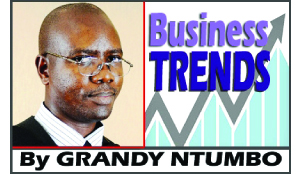 LAST week we looked at the need for businesses to develop human capital formation and the effect that has on the business firm’s operational and financial performance.
LAST week we looked at the need for businesses to develop human capital formation and the effect that has on the business firm’s operational and financial performance.
From last week’s article’s case study, we saw how the workers of a certain firm have been going without pay for a continuous period of up
to seven months.
The firm has been continuously operating and making goods for sale and everything else going on normally and yet the workers have not been paid.
This case study and other publicly available information is our basis to demonstrate that it is not only the skill content resident in the
labour force that drives labour productivity.
In fact, it is the business firm’s perception of the labour force that forms the bedrock of the firm’s human resource strategy and consequently the degree of labour productivity.
This in turn impacts the long term performance of both the work force and the operational and financial performance of the firm.
The human resource strategy feeds into the overall corporate and business strategy.
One of the most recent developments in global business trends is strategic management. Strategic management deals with the process of crafting sustainable business strategies through knowledge creation, dissemination, interpretation and implementation.
The above process involves workers who have to be made to behave in a certain way to disseminate the appropriate knowledge.
A dissatisfied worker is highly unlikely to disseminate strategic knowledge and may instead work to the advantage of the competitors.
In the recent past, we have seen some profile companies in Zambia being successfully set up by workers who were once employees of direct competitors.
This goes to explain the effect of industrial dissatisfaction.
Several firm’s dissatisfied workers have in practice passed on strategic knowledge from their current employers to their fiercest competitors. Empirical evidence in strategic management reveals that at the heart of strategic management research is the finding that firms compete with core competences and strategic capabilities embedded in the organisation overtime through organisational learning processes.
Additionally, a firm’s ability to distribute acquired and created knowledge is of primary importance for organisational renewal.
In the process of strategic knowledge interpretation, organisational members interpret new information about potential opportunities through a mutual process of interaction.
A recent study in Finland of 182 firms in 2009, revealed an interpolated relationship between strategic learning and firm performance.
We must keep on awakening to the increasing reality that the role of the workforce is changing.
Strategic management regards the labour force as strategic assets.
Firms must deal increasingly with matters of workforce diversity, skills, training, values and beliefs.
Successful managers in the 21st century should have to understand the dynamics of workforce diversity and know how to harness it to sustain a high-performance work culture.
Strategic management has postulated that human behaviour is a function of the person and the environment which include job satisfaction, job challenge, adequate pay and fringe benefits, and safe working conditions.
For every employee’s action, there are reactions at the managerial and environmental levels.
To fully understand the interplay between managers, organisations and employees, it is necessary to characterise the difference between employee needs and organisational productivity.
As the organisations we live and work in become more complex, we need new knowledge and skills to stay productive in our work lives and to make ongoing contributions to our firm’s competitive advantage.
The two most pressing issues governing organisational success or failure are employee’s needs and the firm’s need for productivity and strategic success.
For instance, employees are interested in receiving their monthly salaries as in the case study, job satisfaction, job challenge, adequate pay and fringe benefits, and safe working conditions.
The organisation wants higher operational effectiveness, or the optimum production of goods and services with the least expenditure of resources.
Well-managed firms are constantly responsive to employee needs and operational effectiveness, because this helps support competitive advantage, a rate of return that exceeds the industry’s average.
To become a versatile business firm, you need an objective understanding of how the organisation’s workforce drives sustainable competitive advantage.
We have so far seen the role that businesses and employers can play to invest in and develop human capital and also make them behave in a productive way towards the business.
Additionally, as the organisations we live and work in become more complex, there arises an inevitable need for new knowledge and skills to stay productive in our working lives and to make ongoing contributions to our firm’s competitive advantage.
We cannot over-emphasise the role of business consultants to help businesses build capacity and strategic awareness in their leadership cadre and the entire workforce at large.
For comments e-mail: ntumbograndy@yahoo.com or call: +260977403113, +260955403113
(The author is the Managing consultant at GN Grant Business Consultant, a fellow of the Association of Chartered Certified Accountants (ACCA), a Master of Business Administration (MBA) holder and a candidate for the Herriot Watt University (Scotland) Doctor of Business Administration)






